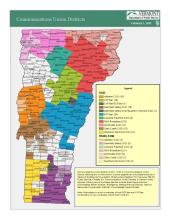Vermont House Backs $150 Million Broadband Plan
A bill dedicating $150 million of anticipated federal funding to create a new state broadband office to coordinate and accelerate the expansion of high-speed Internet access throughout Vermont passed the State House of Representatives last week with overwhelming bipartisan support.
On March 24th, the Vermont House approved H.B. 360 by a vote of 145-1, backing the creation of the Vermont Community Broadband Authority. If the bill becomes law it would help fund and organize the deployment of broadband infrastructure between Vermont’s nine Communications Union Districts (CUDs) and their potential partners, which include electric distribution utilities, nonprofit organizations, the federal government, and private Internet Service Providers (ISPs).
The bill was introduced in the state Senate last Friday, and discussed for the first time in the Senate Finance Committee on Wednesday.
Enabled by a 2015 law, CUDs are local governmental bodies consisting of two or more towns joined together to build communications infrastructure. They were established to create innovative solutions to build broadband networks and provide a combination of Fiber-to-the-Home and fixed wireless Internet connectivity in their respective territories across Vermont, especially in areas where incumbent ISPs fail to provide adequate service.
Vermont’s CUDs, which have called for federal funding assistance since the onset of the pandemic, are ideally positioned to distribute funds in a way that will provide reliable and high-performance Internet access to every nook-and-cranny of the state. Vermont’s active CUDs have already constructed deep pockets of fiber.
Whether or not the CUDs will be able to reach the state’s goal of delivering universal 100/100 Megabits per second (Mbps) Internet service by 2024 now rests in the hands of Vermont’s Senate, Congress, and the Biden Administration as state and federal lawmakers wrestle with how to best expand access to broadband.



